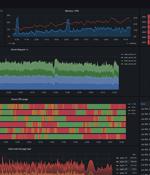Security News

The Federal Bureau of Investigation says a zero-day vulnerability in Zoho's ManageEngine Desktop Central has been under active exploitation by state-backed hacking groups since at least October. "Since at least late October 2021, APT actors have been actively exploiting a zero-day, now identified as CVE-2021-44515, on ManageEngine Desktop Central servers," the FBI's Cyber Division said [PDF].

It's worth noting that Microsoft also patched CVE-2021-43883, a privilege-escalation vulnerability in Windows Installer, for which there's been an exploit circulating, and, reportedly, active targeting by attackers - even though Microsoft said it has seen no exploitation. "After gaining the initial foothold, achieving administrator-level access can allow attackers to disable security tools and deploy additional malware or tools like Mimikatz," he said.

The bug, a Windows AppX Installer spoofing security flaw tracked as CVE-2021-43890, can be exploited remotely by threat actors with low user privileges in high complexity attacks requiring user interaction. "We have investigated reports of a spoofing vulnerability in AppX installer that affects Microsoft Windows. Microsoft is aware of attacks that attempt to exploit this vulnerability by using specially crafted packages that include the malware family known as Emotet/Trickbot/Bazaloader," Microsoft explains.

Today is Microsoft's December 2021 Patch Tuesday, and with it comes fixes for six zero-day vulnerabilities and a total of 67 flaws. Microsoft has fixed 55 vulnerabilities with today's update, with seven classified as Critical and 60 as Important.

Google has released Chrome 96.0.4664.110 for Windows, Mac, and Linux, to address a high-severity zero-day vulnerability exploited in the wild. Although the company says this update may take some time to reach all users, the update has already begun rolling out Chrome 96.0.4664.110 worldwide in the Stable Desktop channel.

Google has rolled out fixes for five security vulnerabilities in its Chrome web browser, including one which it says is being exploited in the wild, making it the 17th such weakness to be disclosed since the start of the year. An anonymous researcher has been credited with discovering and reporting the flaw.

An excruciating, easily exploited flaw in the ubiquitous Java logging library Apache Log4j could allow unauthenticated remote code execution and complete server takeover - and it's being exploited in the wild. New #0-day vulnerability tracked under "Log4Shell" and CVE-2021-44228 discovered in Apache Log4j We are observing attacks in our honeypot infrastructure coming from the TOR network.

Proof-of-concept exploits for a critical zero-day vulnerability in the ubiquitous Apache Log4j Java-based logging library are currently being shared online, exposing home users and enterprises alike to remote code execution attacks. Log4j is developed by the Apache Foundation and is widely used by both enterprise apps and cloud services.

The vulnerability affects all Windows versions, including Windows 11 and Windows Server 2022, and it can be exploited by attackers with limited local accounts to escalate privileges and run code with admin rights. Mitja Kolsek, the co-founder of the 0patch service that delivers hotfixes that don't require system reboots, explains that the issue stems from the way Windows installer creates a Rollback File that allows restoring the data deleted or modified during the installation process.

Open-source analytics and interactive visualization solution Grafana received an emergency update today to fix a high-severity, zero-day vulnerability that enabled remote access to local files. Earlier today, Grafana 8.3.1, 8.2.7, 8.1.8, and 8.0.7 were released to fix a path traversal vulnerability that could allow an attacker to navigate outside the Grafana folder and remotely access restricted locations on the server, such as /etc/password/.